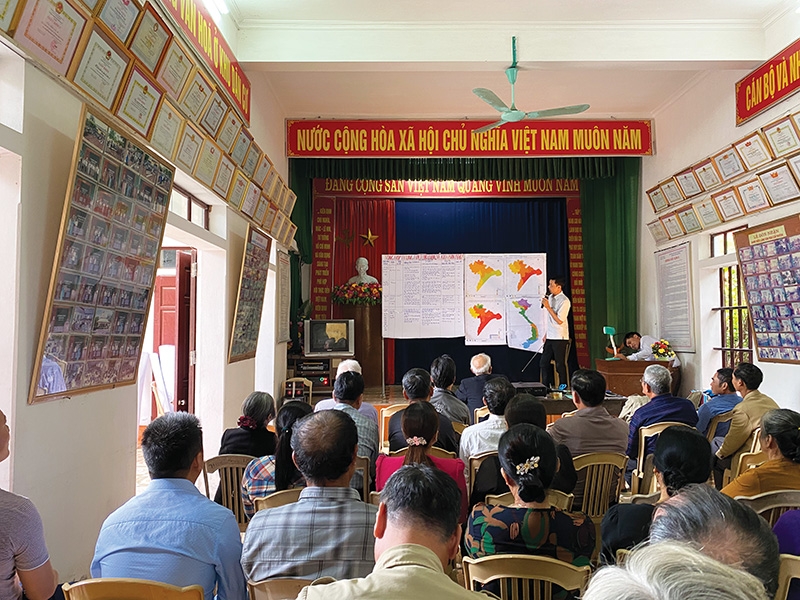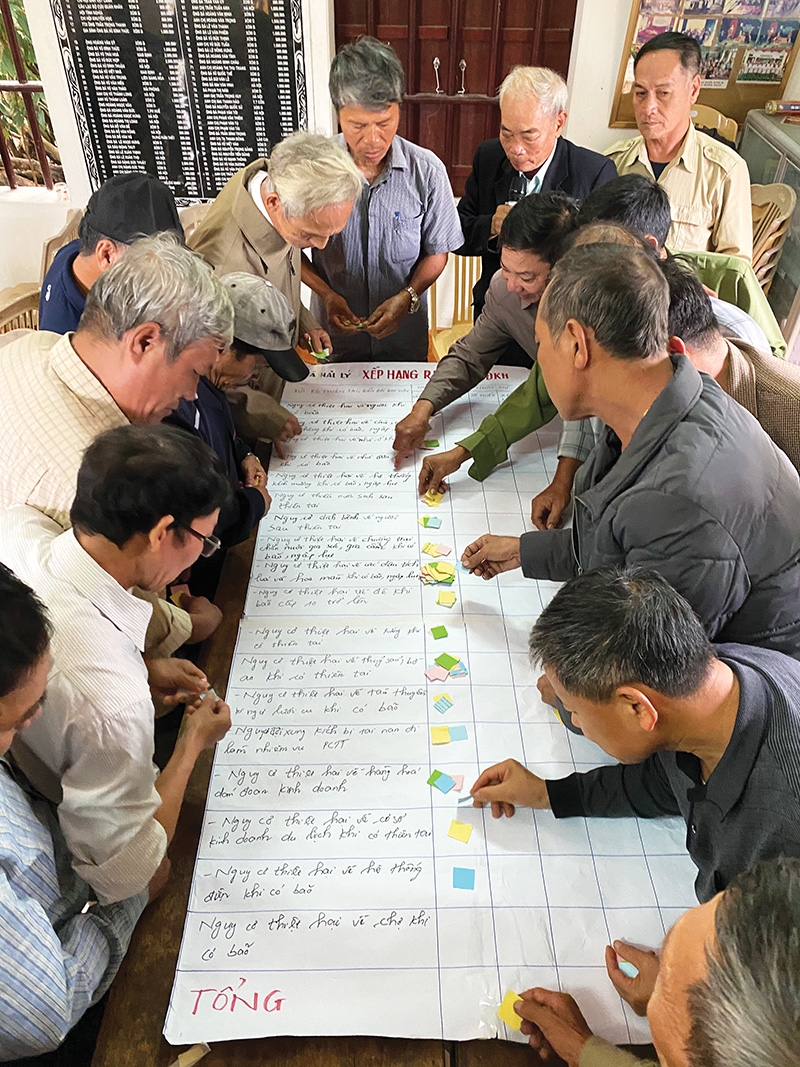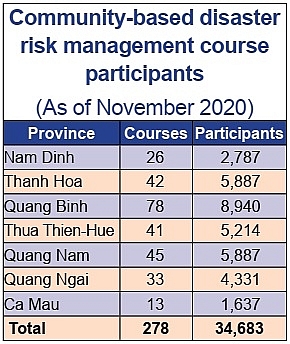
 In The News
In The News
As published in Vietnam Investment Review on 23 Nov 2020
Extreme weather is challenging ordinary Vietnamese people, with many failing to know how to fully protect themselves from natural disasters. However, a far-reaching internationally-backed initiative has become increasingly popular among some localities nationwide as it provides them with community-based disaster risk management skills.

More than a week has elapsed since Quang Minh commune in Ba Don town was hit by a historic flood, which caused untold losses to locals. However the commune, in the central province of Quang Binh, would have suffered from far worse if the locals had not been equipped with knowledge about responding to disasters.
The low-lying commune, located next to a large river and consisting of nearly 2,200 households, is characterised with hillocks, which can be easily isolated by floods. All locals live on rice production and fishing with an low average per capita income of VND3 million ($130) a month.
Tran Van Loc, Secretary of Quang Minh commune’s Party Committee, told VIR that the losses have reduced by approximately half compared to similar past disasters.
“Previously, the locals were often subjected to floods and storms and did not know what to do when they came. But now they have learned how to prepare to respond to the menaces,” Loc said. “For example, locals defend their fishing farms with nets and evacuate to higher locations to avoid damage and protect stored food.”
The knowledge that Loc and many other locals gained was provided by a training course organised in July 2019. The course has enabled locals to determine possible risks, analyse causes, and then advance feasible solutions to cope with the situation. This has enabled them to mitigate losses caused by natural disasters. Moreover, general knowledge about climate change has also been improved.

Diffusing knowledge
The training course in this commune is one of 278 community-based disaster risk management training courses organised since 2018 nationwide by the Vietnam Disaster Management Authority (VnDMA) under the support of the United Nations Development Programme (UNDP) as part of a project to improve the resilience of coastal communities to climate change in Vietnam. This project is funded jointly by the Green Climate Fund (GCF) and the Vietnamese government.
The training courses aim to provide knowledge about community-based disaster risk management in seven coastal provinces – Nam Dinh, Thanh Hoa, Quang Binh, Thua Thien-Hue, Quang Nam, Quang Ngai, and Ca Mau. These provinces are seriously vulnerable to natural disasters and climate change.
“The trainees highly appreciate the training for enhancing the capacity of the local community. It is also a chance for the commune leaders to review all the disaster risk reduction measures taken recently and update with new knowledge under the context of climate change,” project staff member Thai Minh Huong told VIR. “In 2019, as many as 69 training courses were conducted in Quang Binh province, recently damaged by the long-lasting floods and continuous storms. Trainees, for example in Vinh Ninh commune, told us that the course has helped mitigate damages and losses in both human lives and property.”
Located in an area of high risk to such natural disasters as storms, floods, and drought, Vinh Ninh commune of Quang Binh province has enjoyed a similar training course, with the participation of 30 trainees coming from various sectors in the Quang Ninh district’s commune.
Trainees have been equipped with the necessary knowledge and skills to be able to conduct assessment processes and finalise community-based disaster and climate change risk assessment reports. At the same time, they have been able to input data to establish, complete, and enhance the application of disaster and climate risk information systems to support decision-making.
Do Muoi, Deputy Chairman of Vinh Ninh People’s Committee said, “The training course has enabled us to raise awareness about disaster risk reduction, and enhance the resilience of the community.”
Apart from Vinh Ninh commune, the project is currently conducting similar training courses in other coastal communes in the province, where a total 78 courses have been organised, training nearly 9,000 people.
So far, the UNDP has assisted the VnDMA in conducting 278 community-based disaster risk management training courses for coastal communes in Vietnam, benefiting 7,260 directly (of whom 40 per cent are women) and 34,700 indirectly. Another 242 courses of the type will also be held this year and beyond.
The courses have contributed to the implementation of a government programme on community awareness-raising and community-based disaster risk management.
In order to carry out capacity-building activities on disaster prevention and control, the GCF project has also built a team of central and provincial trainers. Most of the trainers of the scheme are those who have many years of experience in training in disaster prevention and climate change in the community. They come from the provincial Red Cross, women’s unions, and some international cooperation programmes, and they are considered central resource persons.
Raising awareness

Vietnam is one of the most disaster-prone countries in the world. Annually, floods, typhoons and other types of natural disasters cause death and hold back essential economic growth. Damages and losses are estimated at $1 billion per year, with about $913 million in 2020 to date. Unfortunately, disasters are becoming more frequent and intense due to the impacts of climate change.
With more than 3,260km of coastline, approximately 30 per cent of Vietnam’s population live in 28 coastal provinces. They are particularly vulnerable to sea level rises and the associated risks of saltwater intrusion, storm surges, and flooding.
Vulnerable communities and groups – mainly ethnic minorities, people with disabilities, poor women, and children – especially in remote areas are most affected. They lack both the resources to recover from damage, and knowledge to better prepare for future disasters.
In cooperation with the VnDMA, the UNDP has developed technical guidelines for post-disaster needs assessments and trained 150 staff and officers from national level institutions and provincial agencies on these new guidelines.
“We have enhanced understanding and access to climate risk information for 28,800 people. We have also built more than 2,000 new resilient houses and repaired 5,000 homes for the poor, near-poor, and single mother households in the coastal provinces of Thanh Hoa, Quang Nam, Quang Binh, Quang Ngai, Thua Thien-Hue, Khanh Hoa, and Phu Yen,” said Caitlin Wiesen, UNDP resident representative in Vietnam.
With GCF’s funding, the project will also make information more accessible to government decision-makers, carried out by combining local knowledge with the best scientific data to develop and produce risk mapping of the entire coastal area. With improved data available, better climate change projections can be generated, helping government policymakers produce transformative policies that will protect coastal communities’ livelihoods now and for future generations.
Experiences which are expected to be shared among stakeholders in these training courses together with community-based disaster and climate change risk assessments will continue to be practical lessons for natural disaster prevention and control in the country.
For Quang Minh commune in Quang Binh province, it wishes to continue enjoying more training courses as the previous one has been more than useful. “Previously we didn’t conduct community-based disaster risk management and assessment. However, since we attended the training course last year, our knowledge has changed,” said Tran Van Loc, secretary of the commune’s Party Committee. “After analysing information, we can make accurate reports which are used to formulate plans on preventing and combating natural disasters and are also integrated in the commune’s socioeconomic development plans.”
 Latest News
Latest News
- Integrating Disaster Risk Reduction into Socio-economic Development Planning processes in Viet Nam (07/04/2022)
- Vietnamese Business Networks Responding to Disasters, Climate Change, and Epidemics (15/10/2021)
- Launch of Student Communications Competition on Resilience to Climate Change and Disasters (12/10/2021)